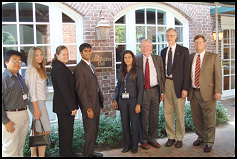
|
 |
2008 Mather Scholars with Dr. Mather (second from right) |
|
Pratik Dave, an aerospace engineering senior at the University of Maryland College Park, was named one of five recipients for the first John Mather Nobel Scholarship by The Henry Foundation, Inc. All five students are performing summer 2008 internships at NASA's Goddard Space Flight Center in Greenbelt, Maryland.
The funding for the scholarships originated in a generous contribution from the John and Jane Mather Foundation for Science and the Arts, which in turn was funded from the award of the 2006 Nobel Prize for Physics to Dr. Mather.
The awardees were selected by a committee of Directors and former Directors of NASA Space Grant College and Fellowship Program state Space Grant consortia. The award consists in the designation "John Mather Nobel Scholar 2008," plus a $3000 scientific travel grant over a two-year period.
Dave is a student in the Aerospace Engineering Honors Program as well as the Gemstone and University Honors programs. At Goddard, he is working with NASA contractor Honeywell Aerospace to design and develop a software tool to predict solar weather events hazardous to NASA missions, and send threat assessment messages to satellite ground operators. Dave says, "after some time working and finding what it is that I would like to specialize in, I plan to return to education and receive a Master's degree in Aerospace Engineering--part-time, of course, while continuing to work for NASA."
Dr. John C. Mather is a Senior Astrophysicist in the Observational Cosmology Laboratory at NASA's Goddard Space Flight Center. His research centers on infrared astronomy and cosmology. Mather won the 2006 Nobel Prize for Physics, awarded by the Royal Swedish Academy of Sciences. Mather shares the prize with George F. Smoot of the University of California for their collaborative work on understanding the Big Bang. Mather and Smoot analyzed data from NASA's Cosmic Background Explorer (COBE), which studied the pattern of radiation from the first few instants after the universe was formed.
[Information for this article was obtained from SpaceRef.com and the NASA Goddard website]
Related Articles:
TERP Raptor Team Receives 2026 AIAA Best Paper Award
Nguyen Lands DARPA Young Faculty Award
Two UMD Teams Among Twelve Selected for NASA’s M2M X-Hab Challenge
Soliton Signatures: A New Strategy for Tracking Teeny Tiny Space Debris
Roving Reporter
Alum Astronaut Reports From Space Station: ‘I’m Still in Awe’
Jeanette Epps: From Engineer to Astronaut
UMD Takes Best in Theme Award at 2022 NASA RASC-AL Competition
First Webb Space Telescope images are here
Hartzell Mission Scientist for NASA SIMPLEx Janus Mission
July 22, 2008
|

